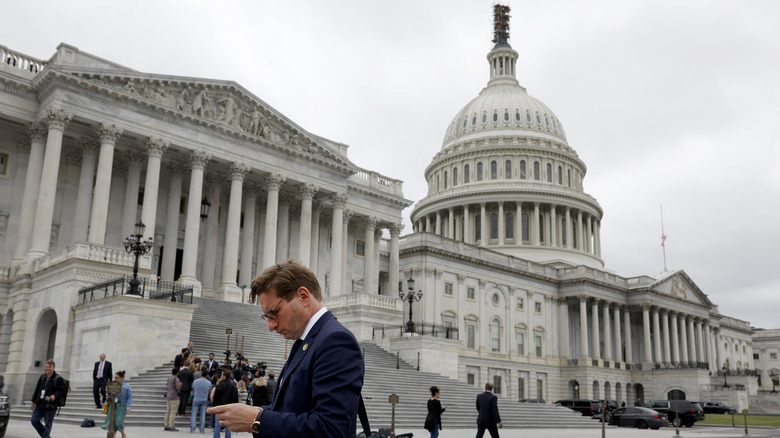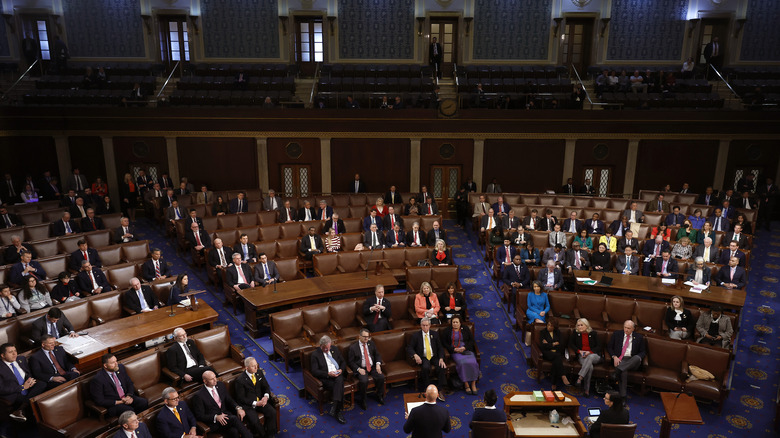How Much Of Our Taxes Pay For Politicians' Salaries?
Between long recesses, potential government shutdowns, and even golf trips, you might find yourself questioning just how much of your taxpayer money goes to paying politicians' salaries. The short answer is that all politicians are paid, in part, with taxpayer money but not all taxpayer money goes to politicians. At the federal level, individual income taxes account for 49% of the country's total federal revenue (with Social Security and Medicare taxes accounting for another 36%). The other 15% of federal revenue comes from a mix of taxes, fees, leases, and even resource sales. This can include taxes from small businesses and corporations, excise and estate taxes, land lease revenue, licensing fees, and even entrance tickets to national parks.
All of this revenue goes to the Treasury Department where it is then combined with money the country has borrowed. In fact, of the $6.3 trillion that the federal government will spend in fiscal year 2023, only $4.8 trillion is financed by these federal revenues while the rest is borrowed. From this pool of money, the federal government pays for things like Social Security, health insurance, defense/military, and, yes, elected federal politicians. State elected politicians are paid through a slightly more confusing process that depends largely on the state. These state politicians can be paid with state taxpayer money, but also, for some states, federal revenues. Plus, their pay rates (unlike at the federal level) can vary widely depending on the state.
Federal politician pay
The Constitution actually codifies federal politician pay, stating, "The Senators and Representatives shall receive a Compensation for their Services, to be ascertained by Law, and paid out of the Treasury of the United States." Our country's founders left it up to Congress to determine their own pay, and today that compensation is streamlined for politicians across the Executive, Legislative, and Judicial branches. With that being said, the lowest-paid members of these branches are still paid more than the vast majority of Americans. Since 2009, taxpayer money has paid House and Senate members a $174,000 salary (with Majority and Minority Leaders earning $193,400). At the top end of this pay scale is the President who earns $400,000 annually.
However, these publicly listed salaries often do not convey the entire financial story of our politicians. For instance, Congressional salaries do not factor in fringe benefits that, over the years, Congress has actually created for itself including health coverage and pensions. These benefits are not only considerably more generous than private sector employees receive but also other federal employees. Estimates have Congressional salaries, with benefits included, closer to $285,000 a year. Plus, many members of Congress receive additional income from various business, investment, and family wealth sources so the income level of a specific Congressional representative is not always entirely taxpayer-supported. It's also important to mention that the monumental cost of running for office increasingly makes it only possible for already wealthy individuals to even run for a Congressional seat in the first place. This has created a situation where wealthy individuals are largely overrepresented in our government.
State politician pay
You might be surprised to learn just how little state legislators make. This is mainly due to the fact that state politicians have a far less standardized way of being paid which can include any combination of state, federal, or mixed tax income depending on the state's pay structure. Due to the variability of tax rates, how much you, as an individual, contribute at the state level depends largely on the state you live in. Many state legislators have base salaries (though New Mexico is unsalaried) and are compensated for mileage. However, some states pay legislators per actual legislative day or per calendar day, and some include additional per diem pay for legislative days. Many states view state legislators as part-time, which can lead qualified candidates to quit or not even run in the first place due to the financial strain.
To make the matter even more confusing, 2017 tax code changes capped state tax deductions, meaning that wealthier states are actually paying more. This means that, if you live in a high-income state, you're not only paying taxes for your politicians but could also be helping to pay for other state's politicians. Kathy Fallon, a director at Public Consulting Group, explained to MoneyGeek, "Higher-income states produce the majority of the tax dollars that go into the federal government's pocket." This tax revenue, or lack thereof, can have serious implications on the amount of federal dependence your state might rely on or contribute to, which can impact how much your state's politicians are paid with taxpayer money from your state or from the federal government's revenue pot.


